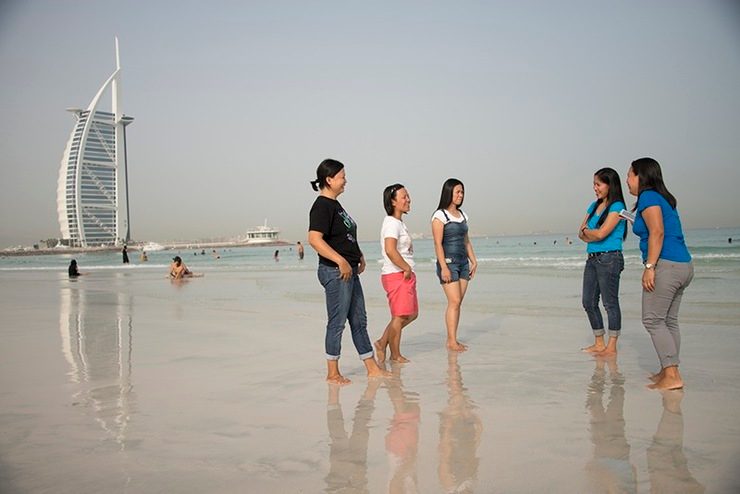SUMMARY
This is AI generated summarization, which may have errors. For context, always refer to the full article.

This is Dubai, the Las Vegas of the Middle East sans the alcohol (but only if you don’t know where to look, residents will say), the showgirls and the gambling.
Dubai may not have oil, but its buildings, malls, and villas ensconced in gated communities for expats lure visitors with something else: employment opportunity.
On holiday?
Don’t be surprised if upon your arrival, you are asked, “Are you here on holiday or in search for greater opportunity?” It is a question that will help the one asking point you to the right direction: either to tourist sites or to prospective employers.
To gain entry to Dubai, a Filipino must secure a visa. There are many types of visas, the most ubiquitous and multi-purpose being the “visit visa” which must be sponsored by a relative or spouse or company (for business trips) or airline.
“There are many types of visas to enter Dubai as a tourist, but none of them will allow you to work,” explained Michael Barney Almazar, a partner at Gulf Law, a Dubai-based law firm that specializes in assisting Filipinos.
But it does not stop visitors from making the most out of their 30 or 90-day visit visa to look for an employer willing to hire them and sponsor their work visa.
It is a race against time but a trip to the nearby resort island of Kish, Iran with your passport stamped to show an exit out of Dubai will quickly reset the clock.

The ‘tourist-worker’
For women looking for domestic work, the visit visa is a quick easy way to look for a job in Dubai. Once in Dubai, they can look for an individual to sponsor their work visa so they can work as a nanny or maid.
Under Dubai law, male residents who are heads of the family can sponsor a maid from the designated countries: India, Sri Lanka, Philippines, Ethiopia, Bangladesh and Indonesia.
Merly (not her real name) came to Dubai via a visit visa sponsored by her sister, Maan (also not her real name) but her objective from the beginning was to look for work as a nanny or domestic helper.
They both agreed that this was a simpler process that would allow them to circumvent the cumbersome recruitment and deployment process in the Philippines, avoid paying exorbitant placement fees to a dubious recruitment agency. Plus, Merly would get to meet their prospective employers and negotiate directly with them.
“Mas mahirap pa kung galing sa Pinas. Parang mas maraming problema doon kaming naririnig,” said Merly. (It’s harder to look for employment coming from the Philippines. It seems that there are more problems through that route.)
All in all, Maan and Merly, were able to secure a visit visa for 5 of their other siblings; this was later converted to a work visa.
Irregular migrants
The 2012 Commission on Filipinos Overseas (CFO) estimates show that there are more than 900,000 Filipinos in the UAE. More than 75% of them are temporary workers and 22% are irregular migrants – those who are not properly documented, do not have valid residence or work permits, or who are overstaying.
(See the INFOGRAPHIC: Where in the world are the Filipinos?)
“About 100,000 Filipinos in the UAE are working as domestic workers, nannies or kasambahay,” said Grace Princesa, Philippine ambassador to the UAE.
A comparison of the CFO estimates on the number of irregular migrants in the UAE shows the following:
Commission on Filipinos Overseas: Stock Estimates of Overseas Filipinos
| YEAR | TEMPORARY | IRREGULAR | TOTAL |
| 2012 | 722,621 | 207,230 | 931,562 |
| 2011 | 658,348 | 19,760 | 679,819 |
| 2010 | 606,443 | 28,000 | 636,154 |
CFO 2011 estimates are found here and 2012 estimates here.
Visa-buying and selling
There are other means to acquire a visa if one is in need of a nanny: buying one.
Emirati nationals, often referred to as “mga lokal” have the privilege of sponsoring a servant visa without fulfilling the necessary requirements of minimum salary and living space. Some nationals sell this privilege.
When Joanna had a baby, the salary of her husband Jon-Jon did not meet the minimum salary requirement to sponsor a nanny. Joanna was going to go back to work and they needed a nanny. One Filipino friend who knew about their dilemma offered a solution.
“Mayroon daw siyang friend na may kilalang lokal na nagbebenta ng visa, mga Dh12,000 ($3,000++). Friend of a friend din talaga namin ang naghanap.” (A friend told me he has a friend who knows an Emirati who is willing to sell a visa, about Dh12,000. A friend of a friend of ours helped us look.)
Joanna never saw or met the local who sold his visa privilege to sponsor a maid; it was brokered by another Filipino who acted as a middle man. “The middle man facilitated everything. We just had to give him the money and details about the nanny from the Philippines.”
It wasn’t until a few months later when problems surfaced. The nanny was supposed to accompany Jon-Jon and their baby to Oman on a business trip, and Joanna was set to follow them. “They weren’t allowed to cross the border because there was a case of absconding against the yaya. She was imprisoned and her passport was confiscated.”
Her visa was cancelled by the Emirati national who sponsored it.
Under UAE law, an employer may file a case of absconding against employees and have their visas cancelled if they leave their job without informing or getting the consent of their employer/sponsor. Those charged with absconding are deported and are banned from entering the UAE for a certain period of time.
“Apparently, yung mga ibang lokal, pagkabenta ng visa, kina-cancel din after a while, para mabenta nila uli yung privilege nila sa iba,” said Joanna. (Apparently, some locals, after selling the visa have it cancelled to they can sell their visa sponsorship privilege to someone else.)
The couple’s desperation to find a nanny for their child led them to Nini, a petite Filipina who, when dressed in a zipped up sweatshirt and jeans, looks younger than her 53 years. Her hands tell another story.
On the run
Their bony, dry and ragged appearance are made more evident by the thin bands on her ring and index finger.
Nini is a runaway or takas. Her visa to Dubai was sponsored by an employer whom she worked for as a domestic helper and nanny. She ran away from her employer after not getting her salary for 3 months and working for what, she said, was “almost 24 hours a day.”
“Ang dami niyang dahilan para hindi ako sweldohan. Tumakas na lang ako. Iniwan ko yun passport ko sa kanya. Kasi pagdating ko, hinawakan na nila yun,” she said. (He had so many excuses for not giving my salary. I escaped and left my passport with him. When I arrived, they already took it from me.)
That was almost 7 years ago. Since then, she’s been hiding out, depending on the generosity of various Filipinos, like Joanna, who offer to house her and give or refer her to odd cleaning and babysitting jobs.
“I’m very upfront,” she said about surviving while trying to remain under the radar. “I tell them I have no papers, no passport. Some don’t want to help me because they’ll get into trouble, too. Some do,” said Nini in Filipino, shrugging her shoulders.
Eventually, Joanna and Jon-Jon were able to bring in a nanny from the Philippines. Only this time, they didn’t take any chances. “I had my mother bring her in,” said Joanna who secured a visit visa for both her mother and her “senior citizen companion” who now works for them as their nanny.
Meanwhile, Nini is still on the run. It is difficult, but she said, it is still better than going back to the Philippines. “Ayoko talaga umuwi. Wala namang mangyayari sa akin sa Pilipinas, alam mo yun? Walang trabaho, tapos yung mga anak ko anim, asawa ko pa, umaasa lahat sa akin.”
(I don’t want to go back to the Philippines. There is nothing for me there, you know. No jobs and my 6 kids plus my husband all depend on me.) – Rappler.com
This story is part of the series “Who Takes Care of Nanny’s Children?”, a multi-media reporting project that follows the path of feminized migration starting from areas in the Philippine where most OFW families live to Dubai, UAE and Paris, France. For more stories about OFWs and Pinoys abroad visit www.rappler.com/balikbayan
This project is supported by the Pulitzer Center on Crisis Reporting in Washington, DC under the Persephone Miel Fellowship.
Add a comment
How does this make you feel?
There are no comments yet. Add your comment to start the conversation.